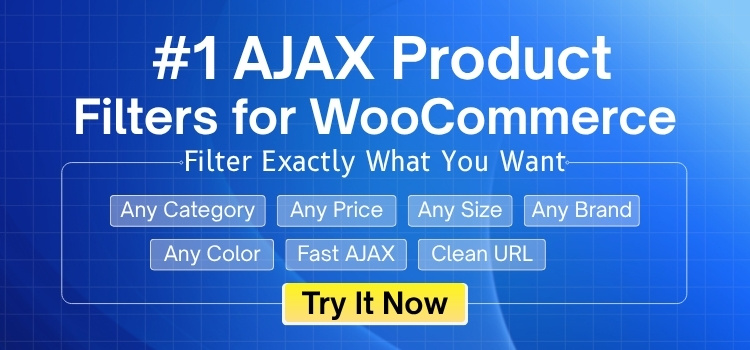You can make your site’s visitors’ shopping experience better and smoother by choosing the right WooCommerce product filter plugins. The right plugin helps people find what they’re looking for faster and makes your store feel more professional. Now you might be thinking about how to choose the best WooCommerce product filter plugins for your site?.
To choose the best WooCommerce product filter plugin, pick one that has filters like price, tags, and categories. It should load fast with AJAX and work well even if you have many products. Make sure it’s easy to use, matches your theme, and lets you change the design. Check if the price fits your budget and choose one that offers good support.
Are you curious about which features matter most or what makes one plugin better than another? If yes, keep reading—this article shares everything you need to know about picking the best product filter plugin for your WooCommerce site.
How to Choose the Best WooCommerce Product Filter Plugins for Your Site?
Choosing the right WooCommerce product filter plugin can help make your online store much easier to use and more fun to shop on. There are a lot of plugins out there, each with different features and price tags. Some are simple, while others offer many features for large stores. Before you make a choice, it’s smart to know what to look for and what matters most. Here are some helpful details about choosing the best plugin.
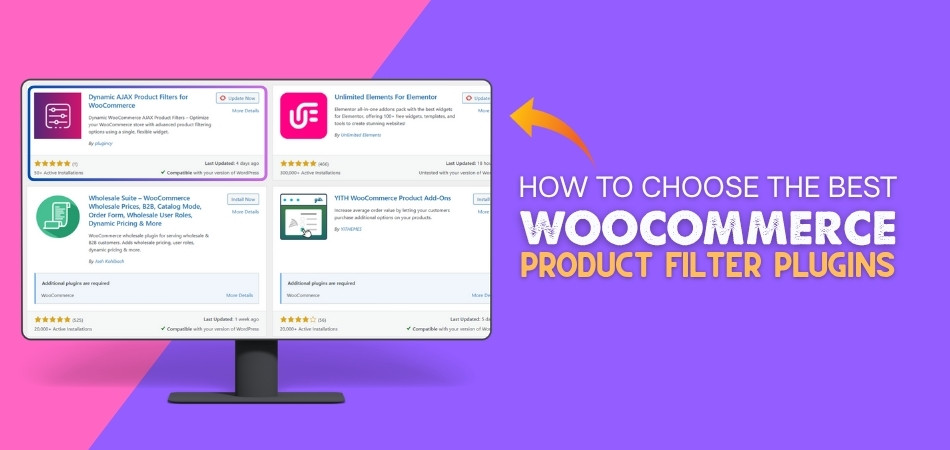
Filter Options
Look at what kind of filters the plugin offers. Good ones let you filter by price, categories, tags, colors, and more. Some even have sliders for price and checkboxes for quick selection. The more filter types you get, the better the shopping experience. Make sure the filters can be changed to match your store’s needs.
Fast Performance
Nobody likes a slow website. A good plugin should load filters quickly using something called AJAX, which means the page doesn’t have to reload every time. This keeps your site fast, even if you have lots of products. Avoid plugins that make your website heavy or slow. Speed is important for happy visitors.
Works with More Products
If you plan to sell more things over time, you need a plugin that can handle it. Some plugins work well with just a few products, but struggle with big stores. Make sure the one you pick can grow with your shop. This is really helpful if you’re running more than one website as well.
Budget-Friendly
Price matters, especially when you’re just starting out. Many plugins offer free versions, which can be great to test things out. But sometimes, the best features are in the paid version. Look for one that gives good value for the price. Don’t pay extra for things you don’t need.
Easy Customization
Your store should look just the way you want. Some filter plugins let you change the colors, layout, and style of the filters. That way, it matches the design of your website. This helps your shop look clean and professional. Always check if the plugin is easy to style.
Theme Compatibility
Not every plugin works with every theme. Before you install it, make sure it works well with your current theme. If not, you might run into problems or weird bugs. Good plugins usually say which themes they support. That saves a lot of trouble later.
Simple to Use
The plugin should be easy to set up and manage. You shouldn’t need any special skills to make it work. Look for something that has a clear setup and doesn’t confuse you. Also, make sure it’s easy for shoppers to use. If it’s too hard, they’ll leave your store.
Helpful Support
Sometimes, things don’t go as planned. That’s why it’s important to pick a plugin that offers good help and support. Check if they answer questions quickly and offer updates. A support team that listens can save you a lot of time and stress. Always check reviews before deciding.
Which Plugin Offers the Best Value for Small Businesses?
If you have a small business with a WooCommerce store, the right product filter plugin can help your customers find things faster. This can lead to more sales. There are many plugins to choose from, so it’s important to pick one that fits your needs and budget. Here’s a table with some popular WooCommerce product filter plugins that are great for small businesses:
| Plugin Name | Key Features | Pricing | Best For |
| Dynamic AJAX Product Filters by Plugincy | AJAX filtering, customizable filters, shortcode integration, theme compatibility | Free / Premium | Small and large businesses seeking dynamic filtering |
| Barn2 WooCommerce Product Filters | AJAX filtering, filter by anything, mobile-friendly, customizable layouts | Premium | Stores needing advanced filtering |
| YITH WooCommerce Ajax Product Filter | Real-time filtering, customizable presets, and theme compatibility | Free / Premium | Budget-conscious businesses |
| Filter Everything | Supports all post types, SEO-friendly URLs, AJAX filtering | Free / Premium | Stores with diverse content |
| JetSmartFilters | Works with Elementor, customizable filters, and dynamic filtering | Premium | Elementor users |
| Themify – WooCommerce Product Filter | Drag-and-drop builder, multiple filter types, responsive design | Free / Premium | Beginners and small shops |
| HUSKY – Products Filter for WooCommerce | Filter by categories, attributes, tags; supports shortcodes and widgets | Free / Premium | Simple filtering needs |
| Premmerce WooCommerce Product Filter | AJAX filtering, fast performance, unlimited site license options | Premium | Growing businesses |
| Product Filter by WBW | Multiple filter types, real-time results, customizable design | Free / Premium | Stores needing visual filters |
| Advanced AJAX Product Filters | Filter by attributes, tags, price, and visual elements like color swatches and sliders | Free / Premium | Stores want visual filtering options |
Each of these plugins offers unique features to enhance your store’s user experience. Whether you’re running a small shop or planning to grow, choosing the right AJAX product filters for WooCommerce can make product search faster and smoother. Consider your store’s needs and style to pick the best fit for your business.
Why Your WooCommerce Store Needs a Product Filter Plugin?
Running an online store is fun, but it also comes with small challenges. One of them is helping people find what they’re looking for without getting lost or tired. That’s where product filter plugins can really help out. Keep reading to see why they matter and how they make your store better.
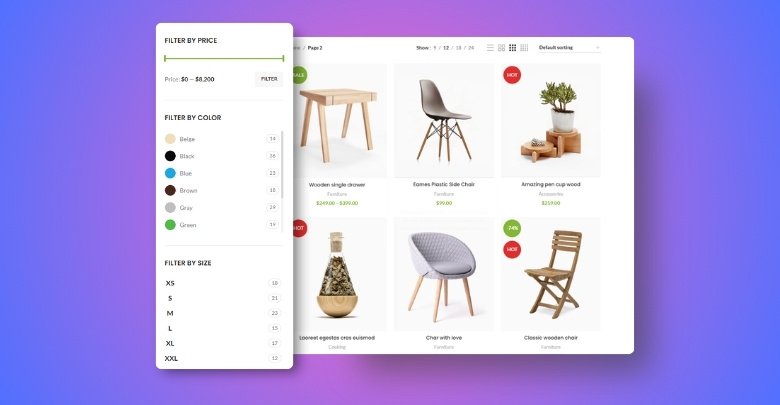
Faster Product Search
Many products can make it difficult for visitors to find what they are looking for. A product filter lets them sort items by size, color, price, or category. This saves time and makes shopping easier. People are more likely to stay and buy if they find things quickly. It’s like giving them a shortcut.
Better Shopping Experience
No one likes to scroll forever just to find one item. Filters keep things neat and clear. Shoppers can set what they want to see and skip what they don’t. This makes the store feel simple and easy to use. A happy shopper is more likely to come back.
Fewer Lost Sales
People might leave your store if they can’t find the product they want. That means you lose a sale even if the item is there. Filters help show the right products faster. So, visitors stay longer and buy more. You won’t miss out just because something was hard to find.
Helps Big Stores
If your store has a lot of products, filters are a must. Searching by hand is too slow when there are hundreds of items. A good filter can handle all your products without slowing down the site. It keeps your store clean and well-organized. Big or small, it makes things easier.
Looks More Professional
Smart filters make your store look more polished. It shows you’ve thought about your customers’ needs. Clean filters and smooth results leave a good impression. It also builds trust because people feel the site is well-made. Good design makes people feel safe to shop.
Easy to Use
Most filter plugins are easy to install and set up. You don’t need to be a tech expert. Once added, they work quietly in the background to help your store run better. Shoppers don’t need any extra steps—they just pick and see the results. It’s simple and useful for everyone.
Are Free Plugins Good Enough for Medium to Large Stores?
Yes, but only for basic needs. Free plugins can help if your store has fewer products and simple filtering needs only. They often support basic filters like price, category, or tags, which work fine for small shops. However, once your store grows, you may face limits in speed, layout, and filter control. Slow loading and missing features can affect how easily shoppers find products on your site.
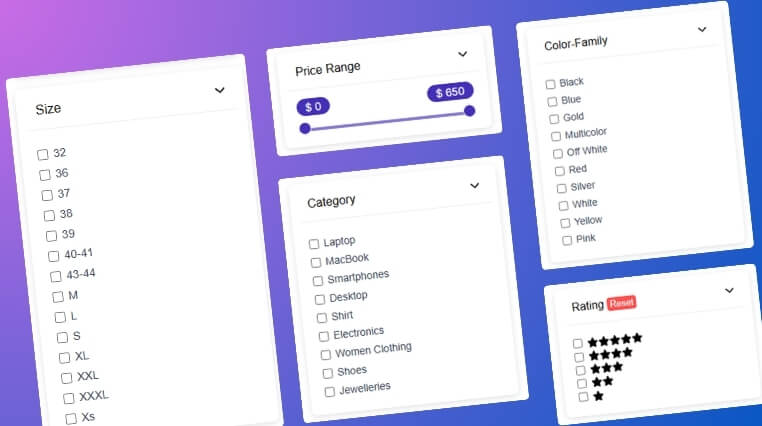
Medium to large stores need filters that load fast and support many product types at once, without making the site slow. Free plugins usually lack advanced features like AJAX filtering, custom styles, or deep filter settings. Also, they may not work well with all themes or other store tools, which causes issues. When you’re expanding your store, these problems can impact user experience and reduce your sales.
For growing shops, it’s better to use a paid plugin that supports advanced filtering without slowing things down. These come with more design choices, better theme support, and smooth performance during high traffic. The pricing of WooCommerce product filter plugins often depends on what features you get and how much support is included. If your store is serious about giving shoppers a smooth path to products, the right plugin is worth the cost.
Common Challenges You Can Face Without Product Filters
Without product filters, shopping becomes slow and confusing. People may leave without buying anything, even if it’s available. Here are some common problems that stores face without proper filtering tools.
- Hard to Find Products: Customers waste time looking through many items when filters are missing, making them frustrated and more likely to leave.
- More Cart Abandonment: Without filters, shoppers can’t easily narrow choices, leading to confusion and causing them to give up before checkout.
- Lower Sales Numbers: When people can’t find what they want quickly, they leave. This leads to fewer purchases and lower daily sales totals.
- Bad User Experience: Cluttered product pages without filters feel messy. Customers feel lost, which makes your store seem unprofessional or unfinished.
- Slow Browsing Time: Shoppers scroll too long to find one item. This makes the shopping process boring and wastes valuable customer time.
- Negative Store Reviews: A Poor shopping experience often leads to bad reviews. These reviews can harm your brand and reduce future customer trust.
- Harder Store Management: Without filters, it’s tough to organize large product lists. Staff spend extra time managing categories and updating listings manually.
- High Bounce Rate: Visitors leave fast when they can’t find products easily. This affects store performance and lowers your chances of making sales.
How to Check Reviews and Ratings of WooCommerce Product Filter Plugins Before Buying?
Before spending money on any WooCommerce product filter plugin, it’s smart to look at what others are saying about it first. Reviews and ratings can tell you a lot about how the plugin works in real stores. They help you understand what’s good and what might be a problem. Here’s how you can check reviews the right way without wasting time or money.
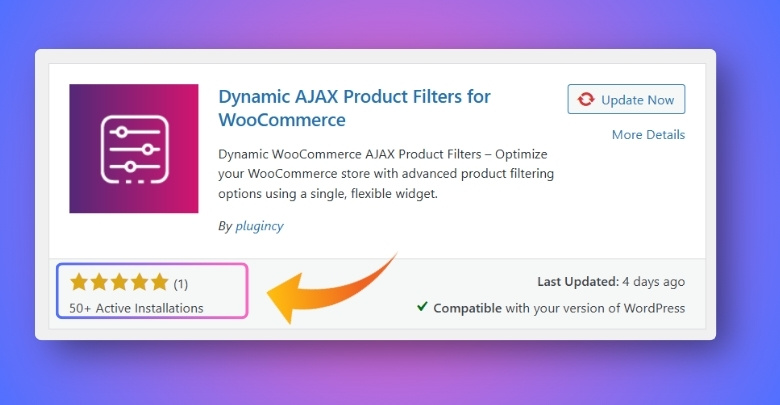
Official Plugin Page
Start by visiting the plugin’s official page, usually on WordPress.org or the plugin’s website. Scroll down to find the reviews section where people rate the plugin. Look at both good and bad reviews to get a clear idea. Pay attention to how recent the reviews are, because old ones might not match the current version. If most reviews are positive and recent, that’s a good sign.
WordPress Plugin Directory
Search for the plugin in the WordPress Plugin Directory and go to its page. You’ll see star ratings and user comments right there. Click on the star levels to read what people said about their experience. Check how the plugin responds to low ratings or issues. A plugin with helpful replies shows the team cares about users.
Review Videos on YouTube
Search the plugin’s name on YouTube to find people testing and reviewing it. Watching someone use it in real time helps you understand how it works. You’ll see if it’s fast, easy, or full of bugs. These videos often show real store examples, which are super helpful. Just make sure the video is not too old or outdated.
Community Forums
Check forums like Reddit, Quora, or Facebook groups where people talk about WordPress plugins. You can search for the plugin name and see what users are saying. Sometimes, you’ll find honest opinions that you won’t see on the official page. These are real talks by people who’ve tried it themselves. Reading these gives you extra info before you decide.
Blog Reviews
Look for simple blog articles or comparison posts that talk about WooCommerce plugins. These blogs usually test a few plugins and share what they liked or didn’t like. Most blogs also rate the plugin on things like speed, design, or support. It’s another good way to see how the plugin stands out. Just don’t trust only one blog—read a few to be sure.
Support Section
Go to the plugin’s support page, usually linked on its main plugin listing. See how fast the support team replies to user questions or problems. If there are too many unanswered posts, that might be a warning sign. A strong support section shows they’re active and helpful. You want a plugin that doesn’t leave you hanging.
Compare Ratings
It’s always better to compare a few plugins instead of picking the first one. Put their reviews side by side and see which has more positive feedback. Also, check if users mention things like easy setup and how well it supports using multiple filter selections in WooCommerce, which helps shoppers narrow down results faster. High ratings don’t always mean the best, so read the full comments too. The best plugin is the one that fits your needs best.
Frequently Asked Questions
If you’re still unsure about WooCommerce product filter plugins, this FAQ section will help. Here, you’ll find answers to common questions people often have but may not think to ask. These quick answers can guide you to make a better choice for your store.
Can I Use More Than One Product Filter Plugin Together?
Using more than one product filter plugin at the same time can cause problems, like slower site speed or plugin conflicts. It’s best to stick with one good filter plugin that covers all your needs. Test any combination first if you really need more than one. Always check your site’s speed and look for errors after installing new plugins.
Will Product Filters Affect My Store’s Mobile Experience?
Yes, a good product filter plugin should be mobile-friendly. Many modern plugins automatically adjust to different screen sizes, so customers can use filters on phones or tablets easily. Make sure you test the plugin on a mobile device before using it. If it doesn’t work well, shoppers might leave your store.
How Do Filters Help With Product Organization?
Filters help you group your products by things like size, color, brand, or price. This makes it easy for shoppers to sort and find what they want fast. Organized products also look more professional to customers. It’s less work for you to keep the store tidy, too.
Do Filter Plugins Slow Down My Website?
Some filter plugins can slow down your site if they’re not well-made or if you have too many products. Look for plugins known for being lightweight and using AJAX for faster filtering. Test your site speed before and after adding a new plugin. Fast loading helps keep your customers happy.
How Often Should I Update My Product Filter Plugin?
You should update your plugin whenever there’s a new version. Updates fix bugs, add features, and improve security. Many plugins offer automatic updates, but you can also check manually. Keeping everything up to date ensures your filters keep working smoothly.
What Happens If a Plugin Is No Longer Supported?
If a filter plugin is not updated anymore, it can stop working with the latest version of WooCommerce. This could cause errors or even break your site’s filter features. It’s a good idea to switch to an actively maintained plugin. Always back up your site before making big changes.
Do Product Filter Plugins Work With All Payment Gateways?
Product filter plugins only organize how products are displayed and do not usually affect payment gateways. They should work smoothly with any payment method your WooCommerce store supports. Just make sure you test your checkout process after installing new plugins. If you notice problems, contact the plugin’s support team.
Can Filters Help With Seasonal or Sale Items?
Yes, you can set up filters for seasonal items, sale items, or special collections. This makes it easy for shoppers to find holiday products or discounted items fast. Filters are a great way to boost sales during special times of the year. You can even add a “Sale” filter for extra visibility.
How Do Filters Improve Store SEO?
Filters can make your site more organized, which helps search engines find your products. Some plugins offer SEO-friendly URLs for filtered results. This means your filtered product pages could show up in search results. Better SEO can bring in more visitors and sales over time.
Final Thoughts
The process of choosing the right WooCommerce Product Filter plugin may seem difficult at first, but once you know what to look for, it becomes much easier. A good product filter can turn a slow, messy store into a smooth and shopper-friendly place. It helps your visitors find what they want faster, which can lead to more clicks and more sales.
When thinking about how to choose the best WooCommerce product filter plugins for your site, focus on the features that matter most to your store, like speed, filter types, ease of use, and design options. Don’t forget to check real user reviews, plugin support, and theme compatibility too. These small checks can make a big difference in how well your plugin performs.
Your store deserves the best tools to grow and keep customers happy. The right product filter plugin is one of those tools. So take your time, compare your options, and choose wisely.
